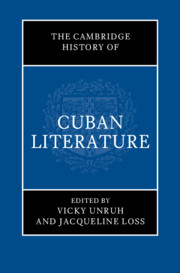Book contents
- The Cambridge History of Cuban Literature
- The Cambridge History of Cuban Literature
- Copyright page
- Dedication
- Contents
- Figures
- Contributors
- Acknowledgments
- Introduction Unfinished Histories
- Part I Literature in the Early Colony
- Part II Cuban Literature’s Long Nineteenth Century
- Part III Literary and Intellectual Culture in the Twentieth-Century Republic
- Part IV The Revolution’s Literary-Cultural Initiatives and Their Early Discontents
- Part V Cuba and Its Diasporas into the New Millennium
- Epilogue
- Select Bibliography
- Index
- References
Introduction - Unfinished Histories
Published online by Cambridge University Press: 31 August 2024
- The Cambridge History of Cuban Literature
- The Cambridge History of Cuban Literature
- Copyright page
- Dedication
- Contents
- Figures
- Contributors
- Acknowledgments
- Introduction Unfinished Histories
- Part I Literature in the Early Colony
- Part II Cuban Literature’s Long Nineteenth Century
- Part III Literary and Intellectual Culture in the Twentieth-Century Republic
- Part IV The Revolution’s Literary-Cultural Initiatives and Their Early Discontents
- Part V Cuba and Its Diasporas into the New Millennium
- Epilogue
- Select Bibliography
- Index
- References
Summary
This introduction first examines what the shifting shapes, geographic relocations, and contextual debates embodied in sculpted monuments to Cuba’s literary-cultural figures tell us about the travels over time and location of Cuban literary culture itself, in order to posit the antimonumentalizing approach to its topic taken by The Cambridge History of Cuban Literature, recognizing the always unfinished, dynamic quality of such histories as they are told and retold from different locations. Exemplifying this approach, the introduction unpacks the complexities inherent in the terms constituting the volume’s title – “history,” “Cuban,” and “literature” – for a book crafted in the twenty-first century, as well as the challenges of literary-cultural “translation” implicit in a volume written in English and conceptualized from the United States about a literary tradition created primarily in Spanish, but also in French, German, English, and, at moments, in Haitian Creole or Kreyòl or Angolan Portuguese. After then reviewing the book’s relationship to existing scholarship, the introduction offers brief summaries of the book’s forty-six essays by fifty-one contributing authors.
Keywords
- Type
- Chapter
- Information
- The Cambridge History of Cuban Literature , pp. 1 - 38Publisher: Cambridge University PressPrint publication year: 2024

